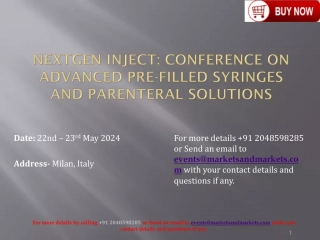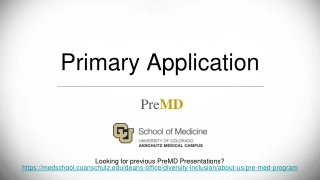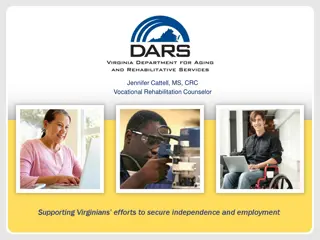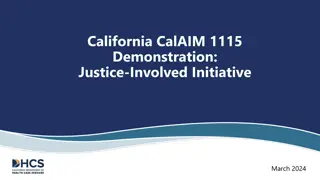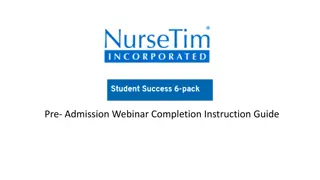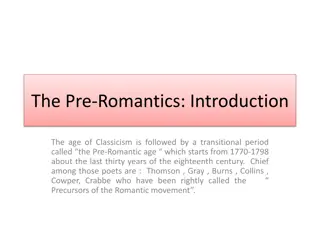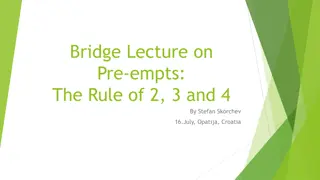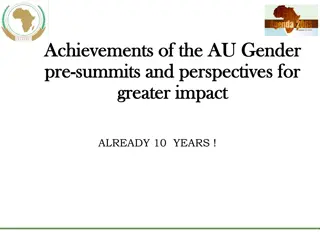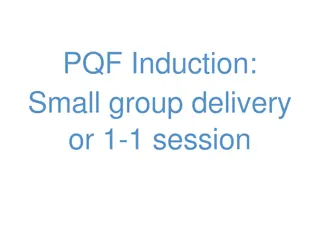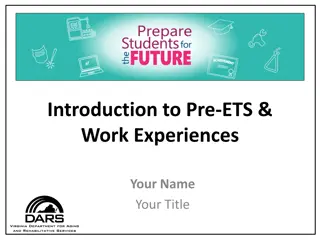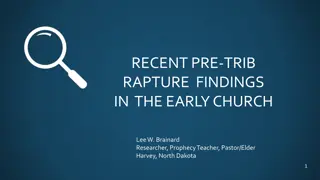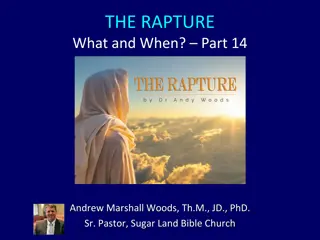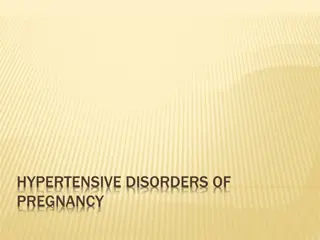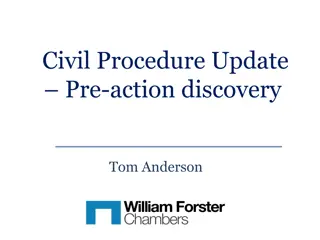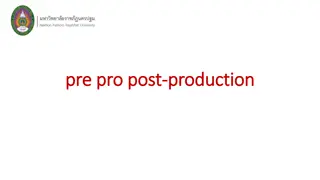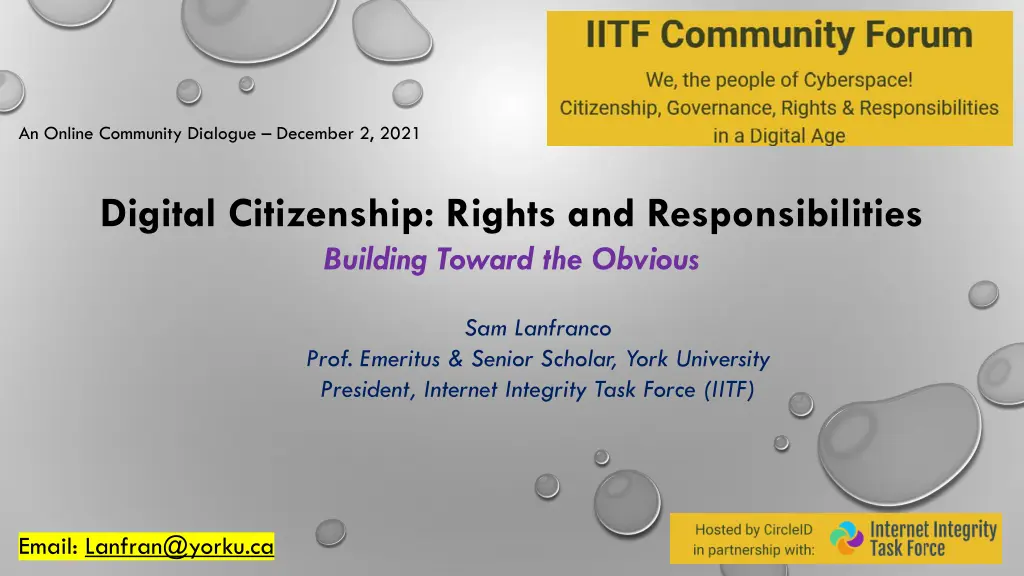
Building Digital Citizenship: Rights, Responsibilities, and Integrity in the Online Community
Explore the challenges, goals, and strategies for enhancing digital governance, trust, and integrity in online societies. Reflect on the past and look towards a future driven by political and social will for a better internet ecosystem.
Uploaded on | 0 Views
Download Presentation

Please find below an Image/Link to download the presentation.
The content on the website is provided AS IS for your information and personal use only. It may not be sold, licensed, or shared on other websites without obtaining consent from the author. If you encounter any issues during the download, it is possible that the publisher has removed the file from their server.
You are allowed to download the files provided on this website for personal or commercial use, subject to the condition that they are used lawfully. All files are the property of their respective owners.
The content on the website is provided AS IS for your information and personal use only. It may not be sold, licensed, or shared on other websites without obtaining consent from the author.
E N D
Presentation Transcript
An Online Community Dialogue December 2, 2021 Digital Citizenship: Rights and Responsibilities Building Toward the Obvious Sam Lanfranco Prof. Emeritus & Senior Scholar, York University President, Internet Integrity Task Force (IITF) Email: Lanfran@yorku.ca
What is Our Challenge? Low Integrity in Digital Governance, Business, & Society Low Trust in Digital Policies, Processes, and Practices But as Harari reminds us in Sapiens: The Internet We built it. Where it is lacking, we can improve it.
What are Our Goals? Restore Integrity to Digital Policies, Processes, and Practices Restore Trust to Society s Social Contract & Social Fabric in order to: Preserve our Dignity in Free & Open Society John Locke
What is The Strategy? We have Internet ecosystem Digital Residency The Virtual is as real as the Literal Virtual Worlds > Religion the Psyche Internet Built On > Belief Science Technology Digital Residency requires Digital Citizenship Rights & Responsibilities built on Principles No one-off whack a mole approach to symptoms
Look Back: 20th Century Political Will Post World War One: Weak Political Will Failed League of Nations (no multilateral forum) Bad Treaty of Versailles (economic consequences) Nationalism (France vs Great Britain over Germany) Great Depression, the Holocaust, and World War Two Post World War Two: Strong Political Will United Nations & Multilateral Organizations The UDHR & multilateral rights efforts The IBRD/WB/IMF, & economic partnerships
Hope for the 21st Century Political & Social Will (Without prior disasters) Internet ecosystem Integrity and Trust The Internet Ecosystem: We built it. We can fix it. Where to Start? Renew: Respect for Science, Logic, Evidence and Analysis Build: Understanding of Responsibilities and Civics Build: Citizen engagement and constituency accountability Understanding and Respect are Sorely Lacking and the source of destructive societal anger.
Build A Charter of Digital Rights & Responsibilities (to serve as a Global Northern Star/Southern Cross Navigational Aid) Principles based Digital Rights and Responsibilities Enshrine National & Global Digital Citizenship Strengthen Integrity in Digital Policies, Processes, and Practices Build Trust in Government, Business, Societal, & Personal Behavior Build Integrity & Trust within the Digital Social Fabric Promote Understanding Digital residency is more than digital visits and digital travels One s Data includes Private, Transactional, Behavioral, & Ambient data Digital Rights & Responsibilities encompass all digital citizens & entities
Efforts on Digital Rights and Responsibilities Strengths: Good Works: (IGF, DataPrivacyBR, EC) Blend of principles based and stakeholder interest policies Forums educate stakeholders and constituencies Weaknesses: Context & Piecemeal Approach Visitor Digital Rights. Not Resident Digital Citizenship Symptomatic focus rather than Systemic focus Weak Treatment of Responsibilities & Governance Expansive focus on Personal Rights Limited focus on Governance and role of Government Politicization of Who should do what .
For Government Missing and Flawed Elements No commitment to Fundamental Principles No notion of Digital Citizenship Symptomatic one-off policy responses Weak engagement and accountability Abuses Digital surveillance and abuse of rights Digital banish/confinement (Internet/cell shut down) Denial of what should be digital rights
For Business Entities Missing & Flawed Elements No commitment to Fundamental Principles or Digital Citizenship Internet ecosystem treated as owned and occupied colonial territory Users/customers treated as indentured digital data sources No governance oversight and claim to self-accountability Abuses Non-accountable corporate self-governance Digital banishment as corporate decision (without recourse) Unconstrained uses of indentured digital data Limitless (AI) build of digital personas and avatars Selective information, evidence and analysis Influence commercial, societal, and other behavior Shape knowledge and behavior without limit
For Societal Entities Missing and Flawed Elements Poor understanding of Digital Responsibilities and Digital Citizenship Excess sense of Digital Rights (c.f, Covid-19 mask/vaccine fights) Vague policy demands: Somebody should do Something about That. What That? What Somebody? and What Something? Low rigor in evidence assembly, analysis & policy development Building Forward Understanding the need for Digital Citizenship Understanding Rights and Responsibilities Engaged in building Principles-basis Digital Citizenship Engaged in the processes of governance
What is Our Task Here? A Charter of Digital Rights and Responsibilities as a foundation for National & Global Digital Citizenship to guide Digital Integrity in Government, Business, & Societal Behavior and rebuild/extend Integrity and Trust in our Literal and Virtual Social Fabric
A Cautionary Conclusion A Charter of Digital Rights and Responsibilities is not a technical task Global and National Digital Citizenship are not simple legislative tasks They are multistakeholder collaborative exercises To education about, and support, the application of the underlying principles to build Digital Integrity and Trust within their constituencies and across society
Thank you for Listening Education about & collaborative work on the following: Charter of Rights and Responsibilities Global and National Digital Citizenship Digital Integrity in Governance Digital Integrity in Business Digital Integrity in Society Digital Integrity in Policies, Processes & Practices Digital Integrity and Trust in the Social Fabric are in the mission of the Internet Integrity Task Force Follow IITF, join IITF, engage with IITF. We are big Supporters of SDG #17 (Partnering) <iitf.online> Sam Lanfranco <Lanfran@yorku.ca>

